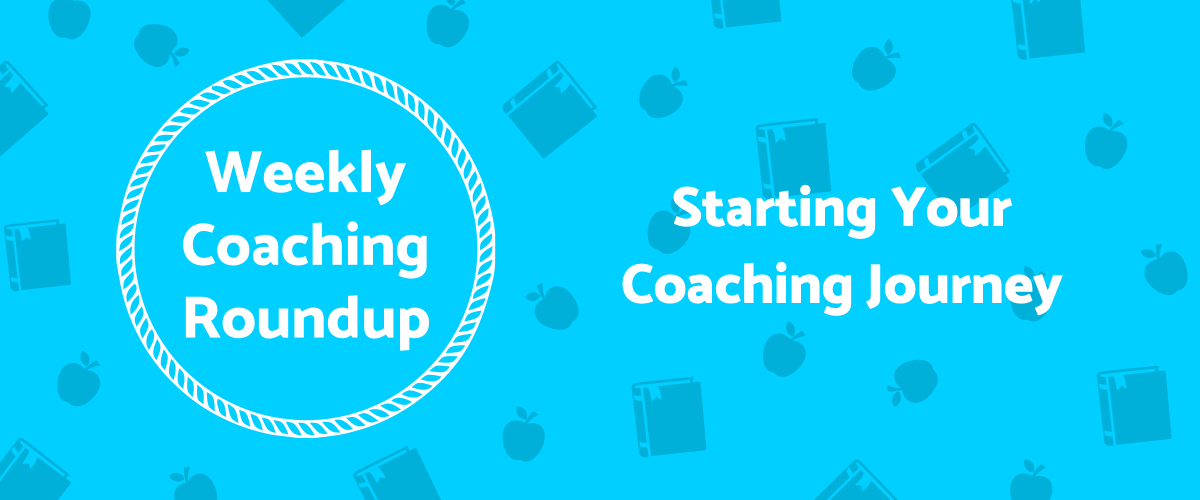


Being handed the reins to coaching can be both exhilarating and frightening. Luckily, many folks have made the transition already and have pointers to share with you! Read on to learn how you can successfully start your coaching journey.
Establishing Trust: Transitioning From Teacher to Coach
Joy DeFors offers some of her time-tested techniques for building trust with your peers while transitioning to a coaching role—specifically those within the same building.
“Just like any relationship in life,
the partnership between instructional coach and classroom teacher takes work. Deliberate and considerate attention to relationship building strengthens rapport between coaches and teachers, ultimately leading to a greater impact on student learning and achievement.”
Ready. Set. Coach!
Maria Papiez reflects on her first year as an IC and passes along her two most valuable tips for others starting their coaching journey.
“Take it from me that your first year
you really want to set a simple goal. It could be focused on building relationships with teachers, especially new teachers, or committing to visit a percentage of classrooms during the school year. . . .
Equally as important to setting a goal is finding a support system.”
How to Be a Successful IC
Stephanie Machado shares three of her crucial tips all new ICs should keep in mind when starting off.
“In your mind, you probably have a perfect picture of what your day-to-day will look like. Keep that tucked away for later, because
you will quickly learn that you must be a jack of all trades. You must be willing to jump in and help wherever necessary.”
Becoming an Instructional Coach
Heather Harding interviews two teachers-turned-ICs about their decision to leave the classroom for a coaching role, the challenges they faced, and more.
“For me, coaching is the kind of endeavor in which, ideally, the coach makes themselves invisible because they are working to have teachers own the process of reflection and implementation. So it will probably be important for me to curb my directive tendencies and strong opinions.
It is also important to me to help teachers find creativity and agency in their work, so that they do not just see themselves as curriculum-delivery vehicles with other people dictating what they do.”
New or Veteran Coach, TeachBoost Has Your Back!
TeachBoost Coach supports ICs by helping them manage their coaching cycles, goals, meetings, and evidence. Coaches can also upload resources and videos to keep everything in one place. Sign up below to try it out!
{{cta(‘33688227-aefb-452f-9cbe-0d1fab8a06af’)}}
Where Do We Begin?
Maggie Colicchio reviews her experiences transitioning from being coached as a teacher to becoming an instructional coach herself.
“Many districts and schools do not define what they expect from instructional coaches. Coaches go into their jobs completely blind, and are often given roles and responsibilities that are not related to coaching. . . . The best way to combat this issue? Partnerships.
The role of a coach starts by establishing trust, expectations, and boundaries—first with your principal, then with the rest of your coachees.”
Best Practices for New ICs
Lily Jones relays advice from five instructional coaches on how to successfully kick-start your coaching career.
“Though you may be stepping into a new position, you have a wealth of experience to draw from. . . .
You are still a teacher. The only thing that’s changed is that now you are teaching teachers instead of students. The same strategies and approaches you used with students can be helpful when working with teachers. As with classroom teaching, it’s important to try ideas, gather feedback, and adjust your approach as needed. It’s a constant learning process!”
Pathways to Coaching
E’Manita Creekmore provides several professional growth steps educators should follow before becoming an IC.
“One tip is to
always be a learner and to allow yourself to grow as well. . . . Take time to learn about what Instructional Coaching is all about. I am not saying go take courses or apply to be Coaching Endorsed (although some colleges do provide that), however, I am saying
if you want to become a coach you have to be knowledgeable about what the job entails. It is extremely important to read many articles, books, listen to podcasts about the life of an Instructional Coach.”
5 Coaching Tips for New ICs
Tonya Moody shares a few of her tips for new or transitioning ICs to start their journey on the right foot.
”
Forming positive relationships with your teachers lies at the heart of great instructional coaching. Creating a plan for forming relationships is most important because they don’t magically form from just being in the same room. Relationships require thoughtful steps to make them happen.
Learning names and intentionally getting to know someone personally is key, but so is making sure you’re visible and excited to interact with your colleagues daily.”
Bonus Content for New ICs
I’m a Coach… Now What?: Embarking on your coaching journey can be both exciting and nerve-racking, so take a moment to hear from fellow coaches on how they transitioned into their role and some tips they’ve learned along the way.
Tips for New Instructional Coaches: Learn some exercised methods from seven of your coaching peers for making your first year of coaching a prosperous one.
Must-Read First Year as a Coach: If you or someone you know is transitioning into a coaching role and looking for tips on getting started, we can help! Check out our coaching series chock-full of reflections, best practices, and advice written by your coaching peers.
Have any tips of your own for new ICs?
Share it with TeachBoost and we’ll highlight it here!
Stay Connected
News, articles, and tips for meeting your district’s goals—delivered to your inbox.








